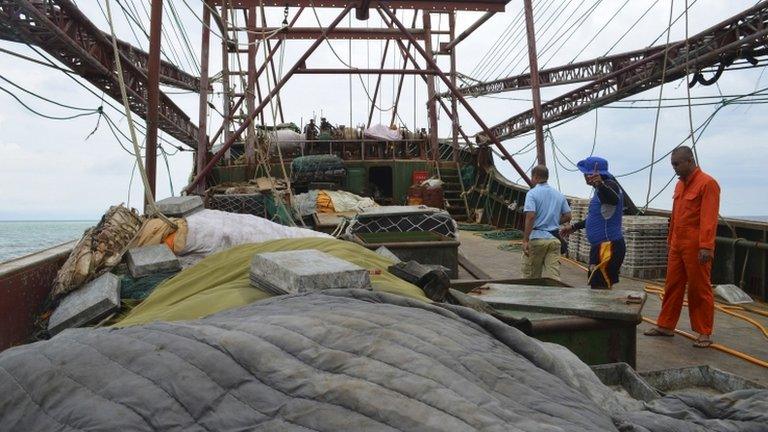Taiwan sees surge in animal smuggling to China
- Published
Cindy Sui explains why some Taiwanese fishermen are turning to smuggling
In the darkness of night recently, 101 Chinese box turtles were snatched from a temporary shelter in southern Taiwan's Kenting National Park.
The culprits had been watching and waiting for an opportunity to make their move. The fact that the turtles were in a national park did not stop them.
Even more surprising was the fact that these turtles had been confiscated from smugglers not long ago to be released into the wild. But they were now back in the smugglers' hands.
This is the latest twist in the cat and mouse game between Taiwanese authorities and an increasingly wide and bold network of animal smugglers who have been tapping into the island's rich fauna to profit from its giant neighbour China's huge appetite for wild animals.
"We can't tell you where the rescued animals are kept; only a small number of staff know. Every time we tell the media, word gets out and we see break-ins," said section chief Lin Kuo-chang of the forestry bureau's wildlife conservation division.
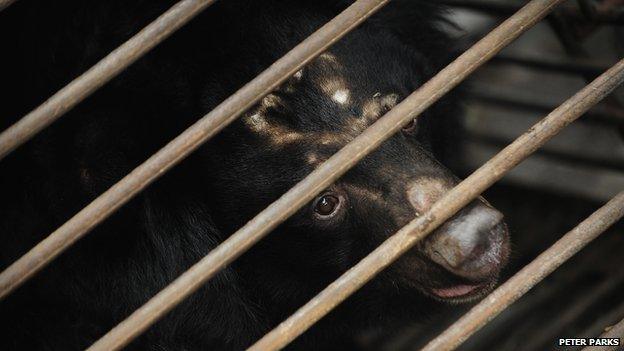
China's growing appetite for endangered animals has led to the introduction of new measures
Rising numbers
In the past few years, Taiwan has seen a sharp spike in the number of animals smuggled to China.
Most of them are protected Chinese box turtles and yellow pond turtles.
From 2006 to 2013, more than 11,000 turtles were confiscated from smugglers. In Taiwan, each turtle sells for $30 (£18) but in China, they can fetch up to $200 (£124).
Last year saw an especially large number of confiscations: 7,010 turtles were confiscated by Taiwan's coast guard - more than any other year. If sold in China, they would be worth $1.4m (£8.7m).
What is driving the demand is Chinese people's increasing wealth and appetite for exotic cuisine, unusual pets and traditional Chinese medicine.
Turtles are the easiest target because they stand a better chance of surviving the smuggling process - they can go without food and water for longer periods of time compared to other animals. The turtles are also considered good luck charms that can bring fortune to their owners.
"Taiwanese people don't catch such turtles because they are considered auspicious. Taiwan's turtles can live for 50 years. But in the past 10 years, China has been collecting these turtles to eat or raise as investment treasures. They call them fung shui turtles," Mr Lin said.
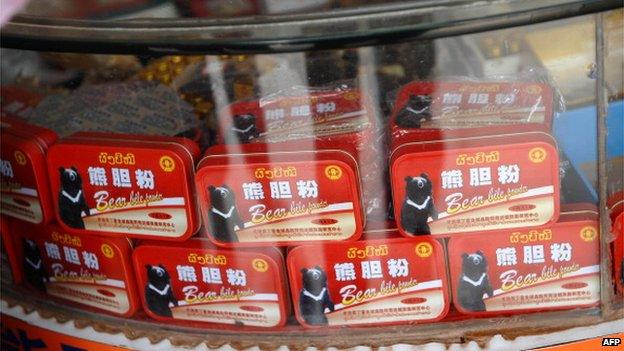
Endangered animals parts have often been used in traditional Chinese medicine
'Easy target'
Taiwan is an easy target because it's separated from mainland China by a body of water called the Taiwan Strait, only 130km (81 miles) wide in the narrowest part. And people on both sides speak the same language.
On top of that, Taiwan still has a sizable population of turtles, whereas the numbers in Japan were small to begin with. Mr Lin also said mass consumption in China nearly wiped out the species.
Contrary to previous decades when the Taiwanese smuggled animals from China because it was wealthier, the tables are now turned. They are now lured by the profits and are being recruited to help smuggle animals to China.
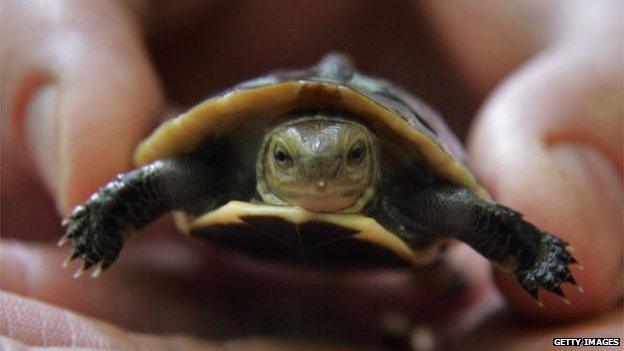
Turtles are commonly smuggled due to their ability to go without food or water for long periods of time
Residents in rural areas collect the animals - including snakes and rare birds - from the wild and sell them to middlemen.
Taiwanese fishermen are then hired to take the animals out to the Taiwan Strait and hand them over to Chinese boats waiting in the waters. Some turtles are smuggled in cargo ship containers.
How the smugglers work has also become common knowledge, one fisherman said.
"They contact each other by telephone, set up a place to meet and exchange the animals at sea. People do this because they are motivated by the profits," he said.
Inspections have also been stepped up.
Last December, 2,010 turtles were found hidden in the belly of a fishing boat when coast guards acting on a tipoff intercepted the boat at sea, near Taiwan's Suao fishing harbour.
In two other cases last year, 2,440 turtles were found in a boat at another harbour and another 2,621 turtles were confiscated from a truck about to take them onto a boat.
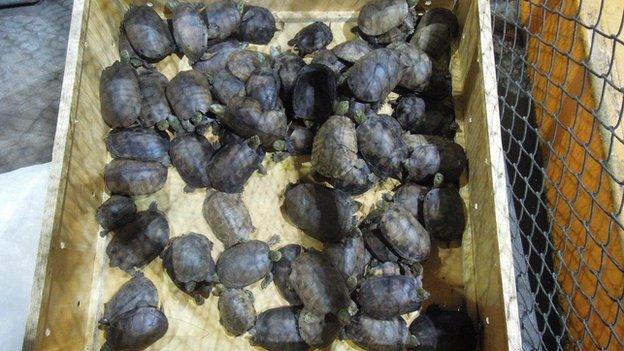
In this image released by Taiwan's forestry bureau, rescued turtles are seen being unloaded from a crate
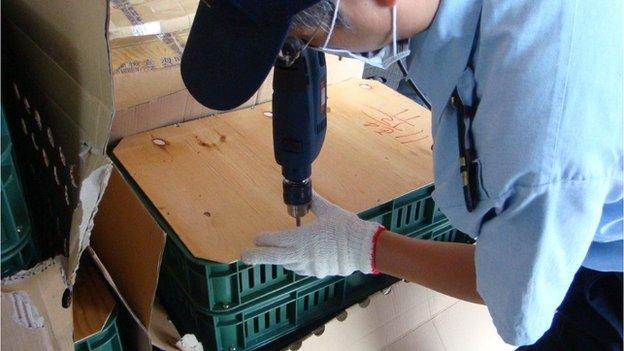
Can regular patrols and inspections help curb the issue of animal smuggling in Taiwan?
Despite a maximum sentence of five years imprisonment and fines of up to NT$1.5m ($49,400; £30,650), the smugglers even steal rescued turtles from shelters including national parks and universities, where they are kept before being released into the wild.
That's why late last year the Taiwanese government set up a turtle conservation area in northern Taiwan - Asia's first for land turtles.
By releasing the animals into a large, unpopulated natural environment, officials hope to make it harder for smugglers to catch them.
But patrolling the area will be difficult. So they are taking other measures too, including rewarding people for tip offs, inspecting fishing boats and teaching the public to protect animals.
Not doing so could eventually harm the island's rich biodiversity.
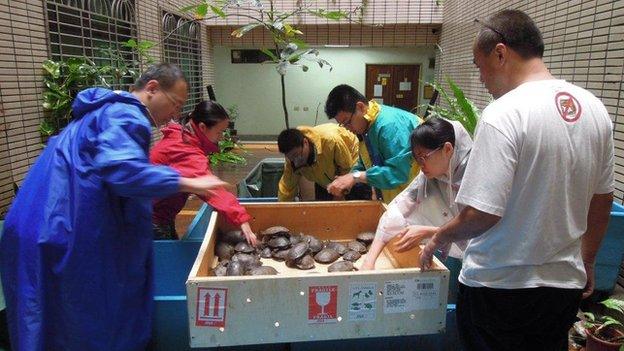
Authorities are seeking new measures to make it harder for smugglers to catch the turtles
Taiwan's tropical-to-temperate climate and topographies have endowed the island with a diverse array of fauna - including hundreds of species of mammals, birds, reptiles and amphibians.
"If we lose one species, it will affect the whole ecology," said Kuan Li-hao, director of the Conservation Division at the Forestry Bureau.
But with many boats plying the waters between Taiwan and China and much money to be made, the number of cases intercepted might be just a fraction of the total number of smuggling cases happening.
- Published12 July 2014
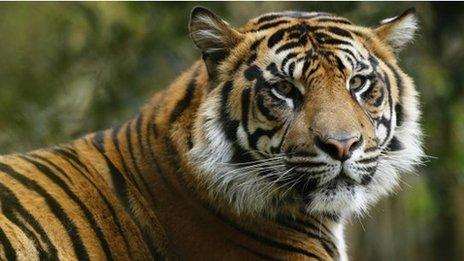
- Published25 April 2014
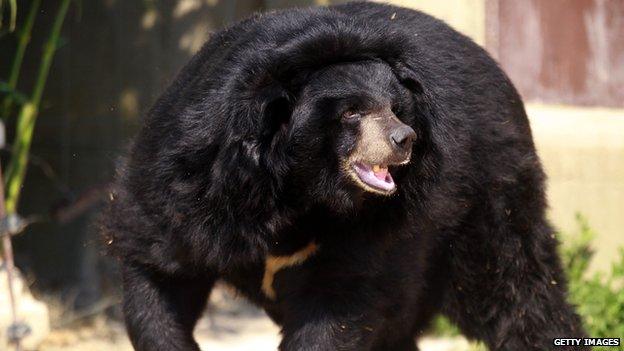
- Published14 February 2014
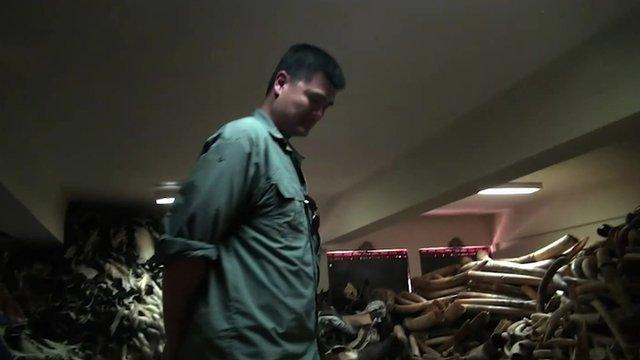
- Published15 April 2013
